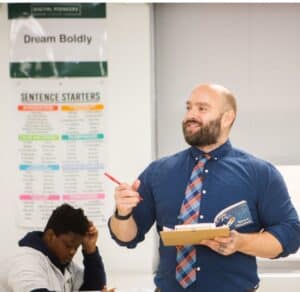We recently sat down to talk to 10th-grade English teacher leader Josh Roe. Last year, his scholars’ growth on the state test was 3 times the citywide average. Josh talks about how DPA has helped him grow as a teacher and as a leader, how one lesson can change the trajectory of a student’s life, and his love of literature and chocolate chip cookies. The conversation has been edited for clarity:
When did you first decide you wanted to become a teacher?
I’m from Alaska. After high school, I went into construction. I wasn’t ready for the rigors of college, and I wanted to start making money and living on my own. I first went to college at 25. I came across a tutoring opportunity at a local charter school. I realized I wanted to be a teacher the moment I started working with kids. Honestly, it was immediate. Working with kids is incredibly rewarding.
Your students demonstrated tremendous growth last year, outperforming the citywide average by 3 times. To what do you attribute your student’s success?
Our students are motivated, hard-working, brilliant, and thrive on teacher feedback. In ELA class we work with a rigorous Common Core aligned curriculum that prepares students for college-level work. I hustle every day to analyze student work in the moment address misconceptions as they arise and clarify using back pocket questions. I created PARCC-aligned questions to provide students with opportunities to grapple with high-level questions on a daily basis, which boosts students’ skills and confidence. Finally, we believe joyful classrooms are thriving classrooms and we always make sure that students are celebrated for their growth and achievement. What gets celebrated gets repeated!
Okay, you’re an English teacher. So what’s your favorite book to teach?
My personal favorite book – the one that got me into literature – is Grapes of Wrath. But my favorite book to teach is Lord of the Flies. There’s just so much symbolism. I’m able to teach philosophy through the lens of characters. I like it when you can use literature as a way to talk about big ideas.
Tell me about a student you have had an outsized impact on?
I recently had a student message me on Facebook to let me know she is now a graduate student at Yale. I taught her 10 years ago, my first year as a teacher. She said there was one day and one particular lesson where I helped her feel comfortable about her identity that changed her life. I would have never had a clue this lesson meant so much to her. You just never know the impact you have on kids.
How is DPA different from other schools you’ve taught at?
Because DPA is a start-up, I’m able to have a direct impact on the culture of the school. Everyone can shape the culture and how it’s implemented day to day because our traditions are not cemented. It’s very empowering to be able to have a hand in making a school what it will become. That power can be scary and unnerving at times. The work is hard, the hours are long, but that mentality helps everyone step up their game.

What do you enjoy most about working at DPA?
DPA lives the mantra of “do whatever it takes.” Our staff goes above and beyond in every way you can think of. We fix things that aren’t working. We problem-solve. A lot of schools talk about a culture of problem-solving. But we actually do it.
How does the leadership team support you as a teacher?
As a teacher, I get at least weekly observations according to a rubric. It’s all transparent. I’ve spent time with my coach going over my rubric. I’ve worked at many charter schools. This is the school where I’ve had the most consistent observations throughout the year.
Also, the school makes sure teachers have the resources they need to teach. If the speakers need to be replaced, or I need more copies of a book, I ask for it and then I get it.
How has DPA made you better as a teacher?
I first learned how to teach in an old-school manner that was not very oriented to social justice. DPA has taught me how to be trauma-informed and how to be culturally responsive in all of my interactions. It takes more skill. It takes more work. DPA has really expanded my toolkit of strategies for how to engage kids who are off-task. I look at every interaction now as an opportunity to either hurt or help a relationship.
How has DPA developed you as a leader?
At DPA, I have been given many opportunities to develop my leadership skills. The nice thing about DPA’s leadership team is I have direct access to everyone, including the CEO. If I have an idea or a plan, I share it with Mashea. And they have supported me in my ambition to develop my leadership skills. They’ve carved out spacefor me to go do observations and academic seminars. Over the summer, I was given the opportunity to be the vice principal of summer school. I got to lead the observation/feedback cycle and share my knowledge as a teacher with the whole team.
Where do you see yourself in 5 years?
I would love to be an instructional coach. I’m passionate about the nerdy academic side of teaching. I love collaborating with teachers about the content. I’ve had a lot of experience and success, and I think helping new teachers would be rewarding.
What is something about yourself that would surprise your students?
I love to bake. I make delicious chocolate chip cookies.
